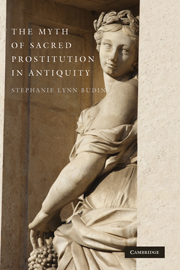Book contents
- Frontmatter
- Contents
- Acknowledgments
- Abbreviations
- THE MYTH OF SACRED PROSTITUTION IN ANTIQUITY
- 1 Introduction
- 2 The Ancient Near Eastern Data
- 3 The So-Called “Evidence”
- 4 Herodotos
- 5 In the Footsteps of Herodotos: Lucian and “Jeremiah”
- 6 Pindar Fragment 122
- 7 Strabo, Confused and Misunderstood
- 8 Klearkhos, Justinus, and Valerius Maximus
- 9 Archaeological “Evidence” from Italy
- 10 The Early Christian Rhetoric
- 11 Last Myths
- Bibliography
- Index
- Index Locorum
8 - Klearkhos, Justinus, and Valerius Maximus
Published online by Cambridge University Press: 18 August 2009
- Frontmatter
- Contents
- Acknowledgments
- Abbreviations
- THE MYTH OF SACRED PROSTITUTION IN ANTIQUITY
- 1 Introduction
- 2 The Ancient Near Eastern Data
- 3 The So-Called “Evidence”
- 4 Herodotos
- 5 In the Footsteps of Herodotos: Lucian and “Jeremiah”
- 6 Pindar Fragment 122
- 7 Strabo, Confused and Misunderstood
- 8 Klearkhos, Justinus, and Valerius Maximus
- 9 Archaeological “Evidence” from Italy
- 10 The Early Christian Rhetoric
- 11 Last Myths
- Bibliography
- Index
- Index Locorum
Summary
Three authors who have become mired in the sacred prostitution debate are Klearkhos of Soli, Pompeius Trogus as epitomized by Justinus, and Valerius Maximus. Klearkhos was a fourth-century bce Peripatetic philosopher whose works are now mostly preserved in Athenaios' third-century ceDeipnosophistai. A fragment coming from the fourth book of Klearkhos' Lives (FGH 6 = Wehrli 43a) has been used to argue for the existence of sacred prostitution in Lydia, Cyprus, and Epizephyrian Lokris in southern Italy. As the evidence will show, this reference has consistently been read out of context, so that Klearkhos' actual subject matter – the wages of decadence – has been eschewed in favor of the sacred prostitution meaning.
Valerius Maximus wrote during the reign of Tiberius in the first century ce and authored the work Memorable Deeds and Sayings, a handbook for Romans studying the art of declamation. In the second book of this work (2.6.15), Valerius castigates the Punic women of Sicca in northern Africa for … something. He actually is not very explicit. Because the passage implicates a Semitic population, involves a temple of Venus, and makes reference to dowries, memories of Herodotos have influenced scholars to see in this passage a reference to sacred prostitution.
Between these two authors comes Pompeius Trogus, who wrote a universal history in the first century bce.
- Type
- Chapter
- Information
- The Myth of Sacred Prostitution in Antiquity , pp. 210 - 246Publisher: Cambridge University PressPrint publication year: 2008



